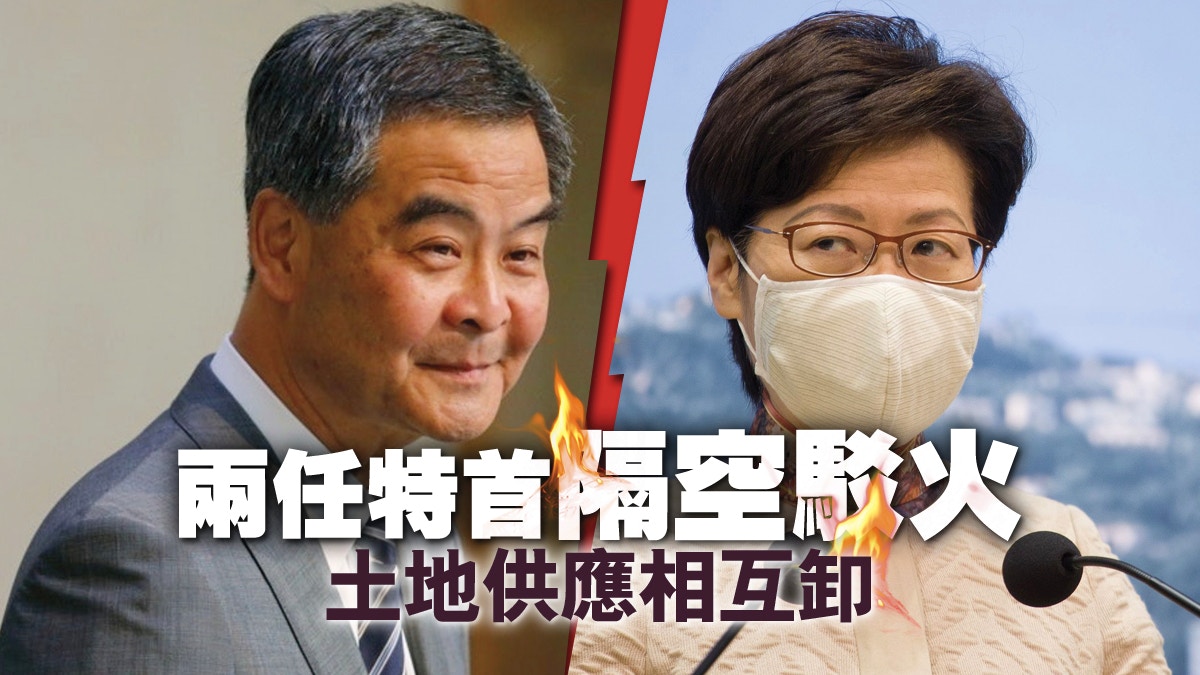editorial
Written by: Hong Kong 01
2021-05-24 06:00
Last update date: 2021-05-24 06:00
Recently, the current Chief Executive Carrie Lam Cheng Yuet-ngor, the former Chief Executive Leung Chun-ying, and the New Democratic Party Legislative Council member Ye Liu Shuyi have publicly confronted Hong Kong's land supply policy.
In the middle of this month, Leung Chun-ying proposed to develop no more than 100 hectares of land located in the border of Tai Lam Country Park for the construction of about 20,000 to 30,000 subsidized public housing units. He also criticized the current government for suspending related research under his tenure. .
In response to media questions, Lam Cheng Yuet-ngor stated that he did not intend to change the original use of the country park land. He also claimed that the current government did not intend to adopt the "stone-sharing" method to "research the land block by block", but hoped to "open up new land." ".
Suk-yee Ip took the opportunity to promote the relocation of 300 hectares of seaside land at the Kwai Tsing Container Terminal, believing that this would free up land for the construction of "new homes" for the middle class.
Apart from the issue of land supply, the three also have different opinions on the Hong Kong civil service team.
Liang Zhenying, who had never worked as a civil servant, bluntly denounced that the government's establishment is too slow, and it can take several weeks to pass documents between departments, which completely lacks the requirement of "do it or die".
On the other hand, Ye Liu Shuyi, a former administrative officer, "redressed" her former colleagues and praised them for their familiarity with the technical details and procedures, which helped the implementation of the system. On the other hand, she admitted that excessive emphasis on rules could easily constitute conformity. She also pointed out that the current civil service system may not be compatible with accountable officials. Have consistent values.
Lam Cheng Yuet-ngor, who was also a former civil servant, downplayed that she and the civil service team were open-minded to accept criticism, and reiterated that the public sector does have the need for reforms to "simplify procedures, streamline structures, and improve efficiency."
The current Chief Executive Lam Cheng Yuet-ngor, the former Chief Executive Liang Zhenying, and the New Democrat Party Legislative Council Member Ye Liu Shuyi are openly confronting Hong Kong's land supply policy.
(Profile picture)
It is worth noting that these three people who have recently voiced criticism of the Hong Kong Government’s past land supply policy, without exception, have been holding actual governance powers for many years.
As the current chief executive, Carrie Lam joined the ranks of administrative officers immediately after graduating from university. He became the Secretary for Development in 2007 and the Chief Secretary for Administration in 2012.
Liang Zhenying has been a non-official member of the Executive Council since the return of Hong Kong. In 1999, he replaced Zhong Shiyuan as the convener of the guild until 2011, and was elected as the vice chairman of the National Committee of the Chinese People's Political Consultative Conference and the leader of the country on the eve of his resignation as the chief executive.
As for Ip Liu Shuyi, although she did not take up an official position after resigning as the Secretary for Security in 2003, she has been elected as a member of the Legislative Council of Hong Kong Island for three consecutive terms since 2008. Since 2012, she has become a non-official member of the Executive Council. She has the same understanding of local policies in recent years. Quite influential.
The above three criticized from different angles that Hong Kong’s land supply strategy had problems in the past, and even said that they did not have any responsibility.
Carrie Lam claimed that the effectiveness of the land supply policy was "predecessors planted trees and future generations enjoyed the shade." Then, I would like to ask if she, who was Secretary for Development 13 years ago and Chief Secretary for Administration nine years ago, has planted any "trees" "Give me a "shadow" for myself as the chief executive?
Leung Chun-ying criticized the civil service organizations for failing to solve the housing problem with a "do it or die" attitude. However, during his tenure as the Chief Executive, did he fail to force the civil servants to "dead" and what results?
And when the Legislative Council was debating the motion "to formulate housing policies to alleviate the ardent housing demand" five years ago, why did Ip Liu Shuyi only know how to come up with a vague amendment that added the words "multi-pronged" and "land" case?
The three of them are obviously not ordinary civilians who have no influence on local policies. At this moment, they dare to take the lead in claiming that Hong Kong's land supply has gone the wrong way in the past, and they each boast that their current plan is the right choice.
Although Lam Cheng Yuet-ngor always packaged the "Lantau Tomorrow" project as the result of the government, the Hong Kong government actually started research on "reclamation outside the Victoria Harbour" and "reclamation of western waters" as early as the period of Tsang Yam-kuen and Leung Chun-ying. The Executive Council and several sessions of the Legislative Council have also been following up related matters. Therefore, the reclamation project alone has not yet been completed, and the three people who have participated in it are all responsible. Otherwise, the direction of the land supply policy in Hong Kong is the Secretary for Development, Does the Chief Secretary for Administration, Legislative Council members, Executive Council members and even the Chief Executive have no right to intervene?
Carrie Lam always packaged the "Lantau Tomorrow" project as the result of this government.
(Profile picture / Photo by Luo Junhao)
The election promise may not be fulfilled afterwards
The main reason why Lam Cheng Yuet-ngor, Leung Chun-ying, and Ip Liu Shu-yee choose to debate the right or wrong of the past policy today is probably the next Chief Executive election in the final analysis.
After all, the "Improvement of the Electoral System (Comprehensive Amendment) Bill 2021," which decided to constitute the Chief Executive Election Committee, passed the Bills Committee's deliberation stage earlier, and is scheduled to resume the second reading debate and conduct at the Legislative Council meeting this Wednesday. The whole committee deliberated, the third reading procedure, and the election of the Election Committee subsector scheduled to be held on September 19 this year, the relevant voter registration has also been closed at the beginning of this month.
For those who are interested in running for the next Chief Executive in March next year, it is of course time to start their work to promote the election platform and win the support of the election committee.
As for the reason why land supply and civil servants have become the focus of controversy, it is also inseparable from the upcoming election of the Chief Executive, because they are both topics that have attracted the attention of the central leadership.
The Vice Premier of the State Council and the leader of the Central Hong Kong and Macao Work Leading Group Han Zheng mentioned earlier that "it is very difficult to solve the land and housing problem in Hong Kong, but there must be a beginning." As of last Sunday (May 16), the Hong Kong and Macao Affairs Office of the State Council made a speech. People also claimed that "anti-China and chaotic Hong Kong elements used loopholes in the system to mix into the civil service... under the guise of so-called "political neutrality" to passivity or refuse to perform statutory duties." In addition, the backward land supply in Hong Kong and the inefficiency of civil servants are inherently long-term for the public. The ills of dissatisfaction.
Perhaps because of this, potential candidates for the Chief Executive election can't wait to show that they see the relevant issues and have good ways to deal with them.
However, it is certainly questionable whether the policy initiatives made solely for political elections will ultimately be fulfilled.
At least with regard to the land supply policy that is the main controversy this time, the two chief executives, Leung Chun-ying and Carrie Lam, were unable to fully fulfill the promises made in the original election platform during their past tenures. The average waiting time for applications is also three years. As of the end of June 2017, the average waiting time for general applicants is still 4.7 years; Carrie Lam’s election platform promised to "increase resources for land-related departments". As a result, the Lands Department Instead, the proportion of government expenditure budget allocations has been reduced from 0.6% in 2018-19 to 0.52% in 2021-2022.
In the future, no matter who is running for election or serving as the next chief executive, he shouldn't speak the vernacular like this again.
In the future, no matter who is running for election or serving as the chief executive, he should no longer speak vernacular about housing policies.
(Data Picture/Photo by Zhang Haowei)
Efficient governance must be deployed in the long term
Another interesting point is that the three politicians unanimously pointed out that land supply requires a "long-term" strategy.
Lam Cheng Yuet-ngor said last week that the current government believes that land supply must have a "long-term plan". In June last year, Liu Shuyi gave the New Democratic Party’s Legislative Council work report to "look for a long-term plan to increase land supply." Leung Chun-ying’s election platform in 2012 She also wrote that "Hong Kong does not lack land, only long-term planning." At the beginning of the same year, Carrie Lam, who was also the Secretary for Development, also said that "the work of establishing land reserves to meet the long-term development needs of Hong Kong"... Let alone the term "long-term" It can refer to how long or how many years, but I believe it certainly does not mean letting anyone use these two words to delay the problem. If you really want to achieve the "long-term", you must start the deployment from the "now" immediately.
At this time a year ago, President Xi Jinping attended the plenary meeting of the Inner Mongolia Autonomous Region delegation at the Third Session of the Thirteenth National People’s Congress. During the deliberations on the work report of the local government, he proposed the concept of “high-efficiency governance”, indicating that local governments should "Acting proactively, not only based on the current situation, but also looking into the long-term... Introduce some effective measures, especially the study and planning of medium and long-term strategic tasks and strategic layouts, and targeted deployment of major tractions for high-quality development and high-efficiency governance. Planning, major reforms, and major policies, grasp the initiative in response to crises, and fight for the development of the initiative."
This "high-efficiency governance" requirement, which emphasizes the first deployment of long-term policies, naturally applies to the Hong Kong SAR government, which is also in the Chinese territory.
It is a pity that the previous senior officials and civil servants of the Hong Kong government have been extremely lack of "proactive actions", and regarded the completely opposite "positive non-intervention" as the golden rule. In particular, the arrangement of senior civil servants for several years has made them less motivated to implement any long-term policy reforms. Therefore, it is reasonable that the chief executive who is born through elections and appointed by the state is capable of reversing this phenomenon.
If even the current chief executive or potential candidates only know how to go to the election project once in a few years, forcibly find reasons to deny the previous government in order to highlight their foresight, and even regard "long-term" policy planning as a common slogan, After being elected, he was unable to try to implement his promises in concrete terms. Such an act cannot be regarded as what the Hong Kong ruler should do to help Hong Kong achieve "long-term peace and stability."
Public housing must have both quality
Can the "unqualified" housing policies of the previous SAR government only be attributed to civil servants?
Transitional housing standards are doubtful, and the search for land to build houses is worrying
How can Guangdong be able to guarantee housing under the five-year hard target and Hong Kong can not?
Public housing reconstruction can also increase housing supply
Please pay attention to the 266th "Hong Kong 01" weekly report published on May 24, 2021, which is available at major newsstands, OK convenience stores and Vango convenience stores.
You can also
click here to
sample the weekly e-newsletter and read more in-depth reports.
Carrie Lam, Leung Chun-ying, Yeh Liu Shuyi, Chief Executive Election 01 Weekly Editorial 01 Views 01 Weekly







/cloudfront-eu-central-1.images.arcpublishing.com/prisa/OOLBKF5K4VFN7EA7IFFA4PMVUE.jpg)
